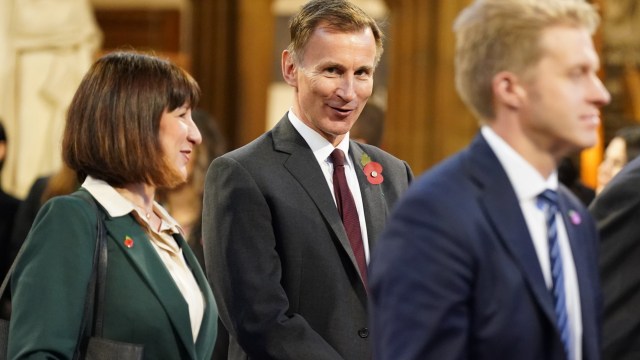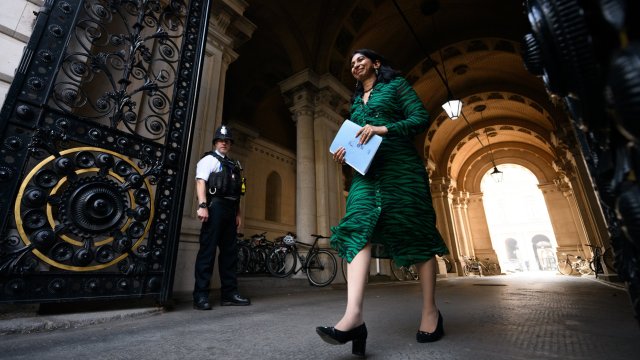
My arrival for a panel on Sky News’s Sunday morning politics show coincided with Jeremy Hunt, perky at an ungodly hour and as on-message as a tele-prompt. Inflation was falling; welfare-to-work schemes needed tightening to push incapacity benefit recipients back to jobs with the aid of mental health support. As for the big question on whether tax cuts will come early in the Autumn Statement this Wednesday, “everything was on the table”.
My sense is that something is brewing in terms of an announcement, given the Chancellor’s insistence that he is “personally” unhappy with the tax burden. There is only so long this wait-and-see tease can go on without creating more agitation among Conservatives who fear being seen as the party that raised post-Covid taxes, but now struggles to deliver on the implicit compensation of a confident pre-election tax cut.
Hunt is a flinty politician whose methodical delivery reminds me of a courteous accountant telling a profligate what we owe the Inland Revenue. He is in line with Rishi Sunak’s insistence on not taking any chances on inflationary risk. But this has not paid dividends for the Tories and the polls are too stuck in the Opposition’s favour to bank on a drift back to the Tories as the party of sound management after the Liz Truss debacle.
A “triumvirate” of Sunak, the “back again” David Cameron and Hunt will now define the election offer. But they need to offer voters some proof that the pledge that the Tories are the party which leaves more money in the pockets of the modestly paid is a real thing.
Or to look at it another way: if all Hunt brings is tough love for welfare claimants and the prospect of inheritance tax cuts benefitting better-off voters of an age to worry about their wills, there is a market gap – which is a very large number of voters, who will be keen to know when their own situation will feel better.
Bang on cue, narrowly avoiding an accidental meeting in make-up, Rachel Reeves arrived to tell presenter Trevor Philips why Labour can now be trusted with the economy, skirting the chasm between the extent of the party’s desire for a staffing, technology and efficiency re-boot for the NHS, a substantial green jobs investment and a house-building surge, all while sticking to the limits of Tory spending. Yes, well.
If the Government were not so busy self-harming and defenestrating its key ministers, sundry holes in the Reeves fuzzy maths would be more obvious. Suggesting that public finances strained on the scale they are can be addressed by raiding non-doms and private school business rates is nonsense. Non-domiciled numbers have been on a downward turn since before the pandemic and squeezing money out of a few very successful public schools, while straining the business model of smaller ones – and probably pushing more of their pupils back onto state school budgets – is an applause line for Labour conference but irrelevant in the grand scheme of revenues and expenditure.
Reeves and Hunt are an intriguing comparison because they are similar in their focus on down-side risks (both would disavow the “magical economics” of the Jeremy Corbyn era and Truss’s reckless tax cutting prospectus). And they are both templates of what their respective parties (outside the lunatic fringes) rate in a financial steward.
Hunt is a natural Tory entrepreneur who made his money setting up language-teaching courses in Japan. Reeves is more comfortable in the world of institutions (Treasury, Washington embassy and Bank of England) than raw money-making – though she did a stint at HBOS on its mortgage policy team.
The problem for Hunt – to the right of the party in his economic preferences, but visibly not much taken by the “Suella wing” of over focus on immigration and heated culture wars – is that he has to operate as Chancellor against a backdrop of chaos. So much so that a statement on the arrival of Cameron and Braverman’s ousting contained the line “Jeremy Hunt remains as Chancellor of the Exchequer”, which only emphasised how rare continuity of office now is.
Hunt has just acquired a new chief secretary to the Treasury (in effect the Chancellor’s deputy) in Laura Trott, who is the sixth person to occupy the role since Rishi Sunak used it as his political launchpad to the top ranks in 2019.
In some ways, Reeves has the easier day job. Her authority is now unquestionable and even a squall over unintended but embarrassing plagiarism in her stolid account of female economists has not dented that. She has also surrounded herself with ex-City and banking sector firepower in advisers and hand-picks her staff. Few spreadsheet mistakes will happen on her watch.
Yet the big question looms unanswered. If Hunt’s tax cuts and some supply-side reforms, prodding foreign investors to come to the UK and pension funds to invest here, do not save a sinking Tory ship, how would Labour secure and stretch the nation’s wobbling prosperity and how realistic is it about the price tag of its ambitions? That is shrouded in mist.
But the present incumbent’s big day should give us a clue of what battle might finally look like, when the delaying tactics run out and the fight for who is in No 11 after the election begins, with the courtesy gloves off.
Anne Mcelvoy is host of POLITICO’s transatlantic Power Play podcast


